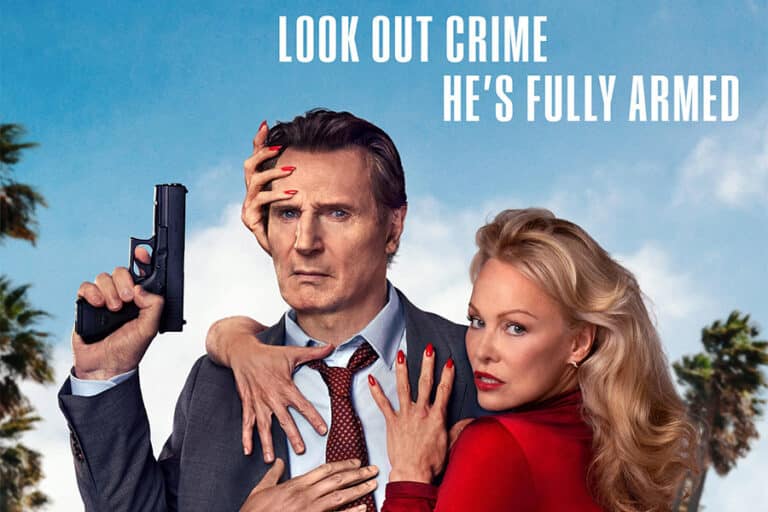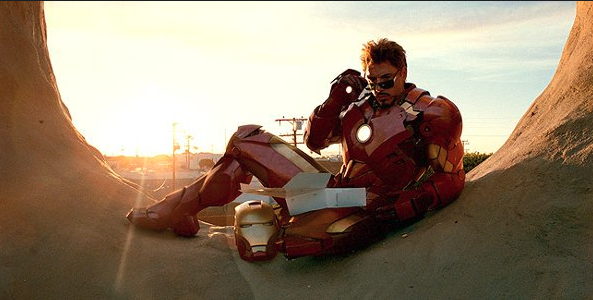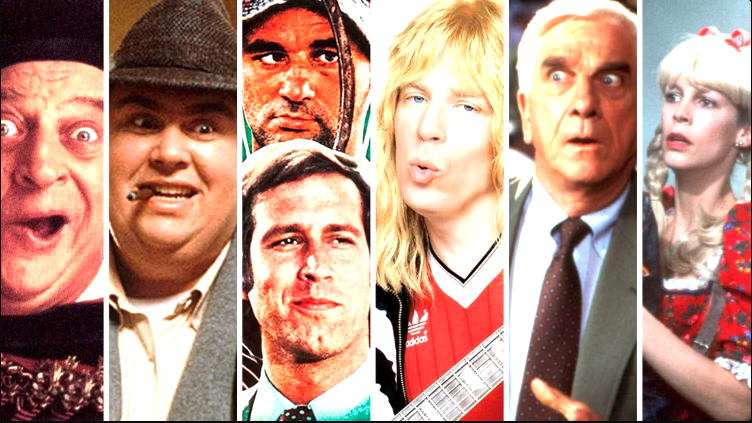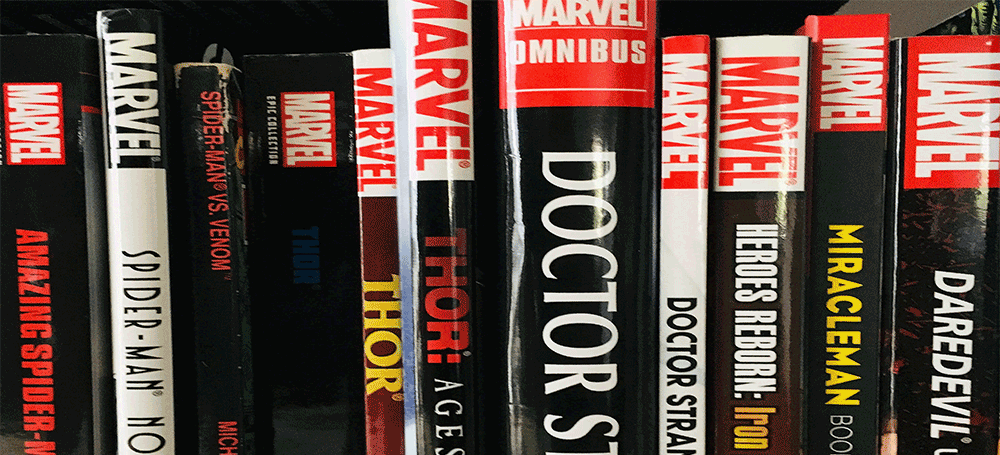Against all the odds, and to the astonishment of many – me included – the new Naked Gun reboot starring Liam Neeson and Pamela Anderson is a hit. Positive critical response and word of mouth has teased people off their sofas and down to their local cinema to watch this silly, nostalgia-filled comedy romp. This is surprising for several reasons.

One friend of mine said he couldn’t remember the last time he heard so many people laughing so loud in a cinema, which got me thinking about how comedy has evolved in Hollywood and its relationship with cinema goers. Because you simply don’t see all-out comedies in cinemas these days. What happened?
Growing up in the 80s, comedy was a surefire bankable cinematic mainstay. For instance, out of the top twenty grossing films of 1984, comedies repped over a quarter, including Ghostbusters, Spinal Tap, Beverly Hills Cop, Sixteen Candles and Police Academy.
The following year, the top twenty films boasted a similar roster: Axel Foley’s debut rolled over to be the second highest grossing film of 1985, followed closely by Police Academy 2, Fletch, National Lampoon’s European Vacation, The Breakfast Club, Pee-wee’s Big Adventure, Brewster’s Millions and Spies Like Us. This pattern continued through the decade, proving that big screen comedy was big business.
This trend continued somewhat through the 90s. In 1994, six of the top twenty draws at the US box office were unapologetic laughfests, including The Santa Clause, The Flintstones, The Mask and Mrs Doubtfire. In 1999, there were five, notably Austin Powers: The Spy Who Shagged Me, Big Daddy, Notting Hill and American Pie.
Now before you dismiss this as one of those “middle-aged bloke moaning that things were better in the old days” articles, I’m well aware that not all of these films were great. I’m also aware how we consume entertainment has changed. I’m just pointing out that there was a time when we got a wider choice of genres duking it out at the box office than we do now. That is objectively a good thing by any metric, and might even encourage more people back into the cinema.
Flash forward to 2024, and laughs could still be found topping multiplex charts, but they were few and, more significantly, wrapped up inside other genres: Deadpool v Wolverine, Despicable Me 4 and Beetlejuice Beetlejuice. Ghostbusters: Frozen Empire, a brand once guaranteed to fill seats and screens with laughs, only broke in at twenty. So far in 2025, all but five of the top twenty US box office films are either superhero, animated or franchise instalments. And of those five outliers, none are straight comedies. So why is this?
Well to a large extent, you can blame Disney. It’s a cliché to gripe that today’s Hollywood is fearful, reactionary, unimaginative and risk averse, chasing the bottom line with merch-ready tentpole franchises, diminishing sequels and cynical reboots, but clichés exist for a reason. A vital Marvel ingredient has always been humour. It’s the magic spice that Stan Lee and his team sprinkled over the comics from the 1960s onwards. Decades later, the beating heart of the Disney’s MCU was always Robert Downey Jr’s arch but effortlessly witty Tony Stark, which is why killing him off in Avengers Endgame inflicted fatal injury to the franchise.

Nearly twenty years since 2008’s Iron Man kickstarted this cinematic leviathan, it seems that recipe has finally turned sour and is increasingly falling out of favour; turns out there’s only so much smug wisecracking we can handle. But this is the point. For decades, this is where cinema goers have been going for their comedy fix. Endless snarky banter between squabbling heroes, dry knowing asides to let the audience know this is all a bit silly.
In an increasingly timid industry, Hollywood only strives to create blockbusters first and then conceal the comedy within. And as a result, the genre in itself seems to have fallen by the wayside.
This is, of course, not a new tactic. Steven Spielberg has always included warm humour in his blockbusters. Indiana Jones and Jurassic Park spring to mind, as do his executive-produced efforts like Gremlins, Back to the Future, The Goonies and Who Framed Roger Rabbit. But back then there was also ample room for pure comedies. Towering alumni of SNL and SCTV owned both Hollywood and the box office.
The 1980s belonged to performers such as Chevy Chase, Bill Murray, Dan Aykroyd, Steve Martin, John Candy and Eddie Murphy. They were the draw. Today, with few exceptions, no star is bigger than the franchise.

l-r: Rodney Dangerfield, John Candy, Billy Murray and Chevy Chase, Michael McKean, Leslie Nielsen, Jame Lee Curtis
What frustrates me so much about this is that while comedy may historically be high risk – “funny” is obviously subjective – it’s cheap to make. So much cheaper than your average superhero film. While I’ll always cherish my beloved Ghostbusters, comedy doesn’t have to be high concept. It doesn’t have to cost a fortune. All you need is a great script, actors with funny bones and a director with comic timing. Even as a proud Marvel and superhero fan, I’d take Withnail & I over The Fantastic Four any day.
The new Naked Gun cost a fraction of a Marvel or DC film, as did Wes Anderson’s The Phoenician Scheme, Tim Robinson vehicle Friendship, the underrated Ballad of Wallis Island and, I’m sure despite the star-studded cameos, the upcoming Spinal Tap sequel. I don’t expect them all to be superhits, but in a time when the once all-conquering Marvel and DC films are now struggling, maybe it’s time Hollywood at least took a punt on comedy. It’s done them very well in the past.
Back in 1988, the original Naked Gun was made for just shy of $15 million but went on to earn just over $150 million and launch two sequels. While not being the ultimate smash, that’s a solid performance. Two years later, Home Alone had a budget of $18 million. It made $476.7 million. Now THAT’S a hell of a return.
Compare it to James Gunn’s admittedly great Superman reboot. That needs to make more than this latter figure just to break even. Oof. I would argue that these days, inflated production, talent and marketing costs means comedies are a much safer box office bet than your typical, modern-day blockbuster.
This is not to say comedy is a genre that has died per se. Those recent films I mentioned above are strong contenders within their field. It’s simply that you’re more likely to encounter them at home on Netflix than in the cinema. And that’s fine. You don’t need an IMAX screen to enjoy a great comedy. I just think it’s a shame we no longer fill our cinemas with the kind of mirth my friend experienced when he went to see Liam Neeson and Pamela Anderson joyfully deadpan for 90 minutes.
Because we all know the magic of cinema is that it is a shared experience – and a room full of people laughing as one is the most magic shared experience of them all.
Hopefully this is the start of a resurrected trend. Right now, big-screen comedy is not enough in itself to warrant Hollywood studio investment. It has to be wrapped up in something bigger. Which is a shame. Because I believe there will always be a market for balls-to-the-wall, all-out comedy films. Mileage will always vary, but it’s a genre that has earned and deserves a place in cinemas alongside the usual carbon-copy juggernauts. Because when comedy is done right, this scrappy, subversive, disruptive and much-needed underdog can more than hold its own.

